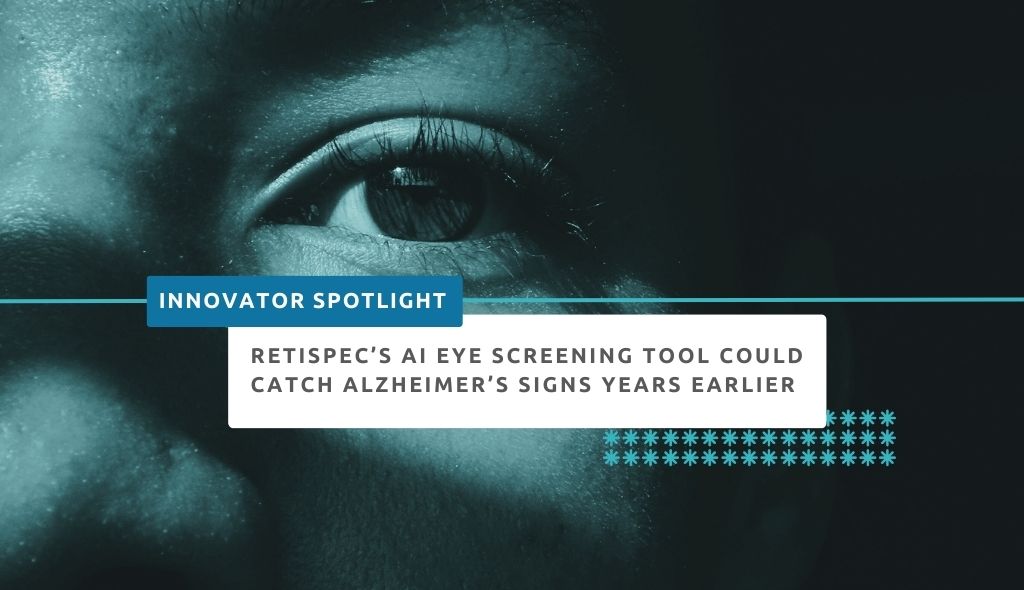Home » RetiSpec’s eye test tool could catch Alzheimer’s signs years earlier
RetiSpec’s eye test tool could catch Alzheimer’s signs years earlier

Founder of RetiSpec hopes the technology will make screening more widespread: “Eye clinics are like Starbucks — they’re everywhere.”
We all know somebody who has received the terrible news. It might be a parent, an aunt, a grandparent. For Eliav Shaked, it was Carole, the mother of a close friend, who was diagnosed with Alzheimer’s in 2015. Shaked was profoundly affected by the rapid decline of this strong, vibrant woman: “She was close to my heart.” He resolved to help others, and started looking into promising areas of research.
“Alzheimer’s is one of the scariest diagnoses you can get,” he says. “But, in my opinion, the sooner you know, the better. You and your family have time to prepare emotionally, prepare financially, and, of course, you have better prospects for treatment.”
Today, Shaked is the CEO and co-founder of RetiSpec, a Toronto-based medical imaging company that has developed an AI platform to detect early signs of Alzheimer’s from a simple eye exam. “The disease has a distinct optical signature, and our goal was to design an easily accessible screening tool that can reliably detect it,” he says.
The retina, with its connections to the brain, can offer crucial information about neurodegenerative disease. Using a hyperspectral sensor in a standard optometrist’s camera, RetiSpec’s platform uses proprietary AI algorithms to detect and measure amyloid proteins, a key marker of the disease, in a routine retinal scan that lasts mere seconds. Studies show that the solution could provide the earliest detectable biomarkers of Alzheimer’s — perhaps more than a decade before the first symptoms show up.
There is no cure for Alzheimer’s, but in July, the U.S. Food and Drug Administration granted full approval to Leqembi, a drug that has shown the ability to slow cognitive decline in a patient. Health Canada is expected to follow suit later this year. And there are other promising medications in development.
“It’s fantastic news,” says Shaked. But there’s a catch. “The drug can only be prescribed by a specialist, and to get to that point, it could take up to 50 months. You have to go through a battery of tests, including genetic testing, family history and an MRI, and once you’ve done all that, you have to wait for the specialist to firm up the diagnosis.”
Positron emission tomography (PET) brain imaging tests are the gold standard for measuring the disease’s progress. There are, however, only a few dozen publicly funded scanners in Canada, and the cost of each test can run in the thousands. Shaked says RetiSpec is committed to keeping the cost of its optical scans in the hundreds. Increased access to screening tools could drastically reduce wait times, down to an estimated 12 to 18 months.
“There are so many people at risk,” he says. “We need to be able to more quickly identify who should be prioritized for treatment.”
That becomes much more challenging as our population ages. According to the Alzheimer Society of Canada, 597,300 people suffered from dementia in 2020. In addition, they required 350,000 carers, whose work is often full-time and unpaid. Those numbers are expected to triple by 2050.
“The health care system is not prepared,” says Shaked. “Not just here in Canada, but around the world.”
Access to specialists has been mostly limited to large urban centres in affluent countries. Shaked feels RetiSpec opens that up to a wider population by having optometrists perform the scans. “Eye clinics are like Starbucks — they’re everywhere,” he says. “Everybody is likely to get their eyes checked at some point.”
Last fall, RetiSpec launched a pilot project with the Toronto Memory Institute, the Alzheimer Society of Canada and other brain health organizations that puts their tech in Toronto community eye clinics. Funded by the Davos Alzheimer’s Collaborative, the project will study integration into the bigger eye care system. “We know the science is accurate,” he says. “But we need to get it into the hands of the end users.”
Summerhill Optometry was the first clinic to participate in the project. “It’s a seamless way to reach thousands of people,” says optometrist Naeem Abdulla, who says that seniors feel less apprehension about an eye exam than a memory test. He adds that the project is a natural fit since optometrists already screen for neurological disorders, such as papilledema, a swelling of the optical nerve that can indicate a brain tumour, and cerebral nerve palsies.
Early results are promising. So far, more than 500 people have been screened at the Summerhill clinic and the Alzheimer Society; the project has expanded to Victoria Village Optometry in North York. Shaked says this expediency is one of the key benefits of the technology, which he plans to submit to Health Canada for approval later this year. In the meantime, the company will reach out to researchers and underrepresented communities for further evaluation.
“We want to establish a footprint in North America first,” he says. “But, we believe we have the potential to impact hundreds of thousands of lives around the world.”
Innovation Factory
Innovation Factory is a business accelerator, dedicated to helping Ontario-based businesses launch, scale, and succeed. We provide start-ups, and scaling companies with advisory services, training, mentorship, and strategic connections to help bring disruptive technologies to market, leverage intellectual property, increase revenues, attract investment and create jobs. Serving as the catalyst for tech innovation in the greater Hamilton area since 2011 we are driven to help: Entrepreneurs bring new ideas to life and to market Small/Medium Enterprises (SMEs) get to the next level Hamilton build a dynamic culture and a community of innovation Innovation can happen anywhere. Our goal is to make it work everywhere. We work to elevate key industry sectors including, advanced manufacturing, clean tech, information technology, integrated mobility, life sciences & health care and social innovations.

